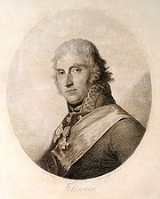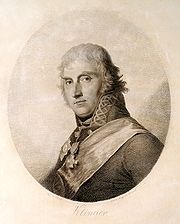
Friedrich Maximilian Klinger
Encyclopedia

Germany
Germany , officially the Federal Republic of Germany , is a federal parliamentary republic in Europe. The country consists of 16 states while the capital and largest city is Berlin. Germany covers an area of 357,021 km2 and has a largely temperate seasonal climate...
dramatist and novelist.
Biography
Klinger was born of humble parentage in FrankfurtFrankfurt
Frankfurt am Main , commonly known simply as Frankfurt, is the largest city in the German state of Hesse and the fifth-largest city in Germany, with a 2010 population of 688,249. The urban area had an estimated population of 2,300,000 in 2010...
. His father died when he was a child, and his early years were a hard struggle. He was enabled, however, in 1774 to enter the university of Gießen, where he studied law. Goethe, with whom he had been acquainted since childhood, helped him in many ways. In 1775 Klinger gained with his tragedy Die Zwillinge a prize offered by the Hamburg theatre, under the auspices of the actress Sophie Charlotte Ackermann
Sophie Charlotte Ackermann
Sophie Charlotte Ackermann was a German actress from Berlin.- Biography :She first married an organist named Schröder, who was unable to support his family. She entered the stage in 1740 in Lüneburg and established her own troupe in 1741 who failed in 1744. She left the stage for three years...
(1714–1792) and her son the famous actor and playwright, Friedrich Ludwig Schröder
Friedrich Ludwig Schröder
Friedrich Ludwig Schröder was a German actor, manager and dramatist.He was born in Schwerin. Shortly after his birth, his mother, Sophie Charlotte Bierreichel , separated from her husband, and, joining a theatrical company, toured with success in Poland and Russia...
(1744–1816). In 1776 Klinger was appointed Theaterdichter to the Seylersche Schauspiel-Gesellschaft and held this post for two years. In 1778 he entered the Austria
Austria
Austria , officially the Republic of Austria , is a landlocked country of roughly 8.4 million people in Central Europe. It is bordered by the Czech Republic and Germany to the north, Slovakia and Hungary to the east, Slovenia and Italy to the south, and Switzerland and Liechtenstein to the...
n military service and took part in the Bavarian war of succession. In 1780 he went to Saint Petersburg
Saint Petersburg
Saint Petersburg is a city and a federal subject of Russia located on the Neva River at the head of the Gulf of Finland on the Baltic Sea...
, became an officer in the Russia
Russia
Russia or , officially known as both Russia and the Russian Federation , is a country in northern Eurasia. It is a federal semi-presidential republic, comprising 83 federal subjects...
n army, was ennobled and attached to the Grand Duke Paul, whom he accompanied on a journey to Italy
Italy
Italy , officially the Italian Republic languages]] under the European Charter for Regional or Minority Languages. In each of these, Italy's official name is as follows:;;;;;;;;), is a unitary parliamentary republic in South-Central Europe. To the north it borders France, Switzerland, Austria and...
and France
France
The French Republic , The French Republic , The French Republic , (commonly known as France , is a unitary semi-presidential republic in Western Europe with several overseas territories and islands located on other continents and in the Indian, Pacific, and Atlantic oceans. Metropolitan France...
. In 1785 he was appointed director of the corps of cadets, and having married Elizabeth, a natural daughter of Empress Catherine the Great, was made praeses of the Academy of Knights in 1799. In 1803 Klinger was nominated by the emperor Alexander curator of the university of Dorpat, an office he held until 1817; in 1811 he became lieutenant-general. He then gradually gave up his official posts, and after living for many years in honourable retirement, died at Dorpat.
Klinger was a man of vigorous moral character and full of fine feeling, though the bitter experiences and deprivations of his youth are largely reflected in his dramas. It was one of his earliest works, Sturm und Drang (1776), which gave its name to this artistic epoch
Sturm und Drang
Sturm und Drang is a proto-Romantic movement in German literature and music taking place from the late 1760s through the early 1780s, in which individual subjectivity and, in particular, extremes of emotion were given free expression in reaction to the perceived constraints of rationalism...
. In addition to this tragedy and Die Zwillinge (1776), the chief plays of his early period of passionate fervour and restless "storm and stress" are Die neue Arria (1776), Simsone Grisaldo (1776) and Stilpo und seine Kinder (1780). To a later period belongs the fine double tragedy of Medea in Korinth and Medea auf dem Kaukasos (1791). In Russia he devoted himself mainly to the writing of philosophical romances, of which the best known are Fausts Leben, Taten und Höllenfahrt (1791), Geschichte Giafars des Barmeciden (1792) and Geschichte Raphaeis de Aquillas (1793). This series was closed in 1803 with Betrachtungen und Gedanken über verschiedene Gegenstände der Welt und der Literatur. In these works Klinger gives calm and dignified expression to the leading ideas which the period of Sturm und Drang had bequeathed to German classical literature.

